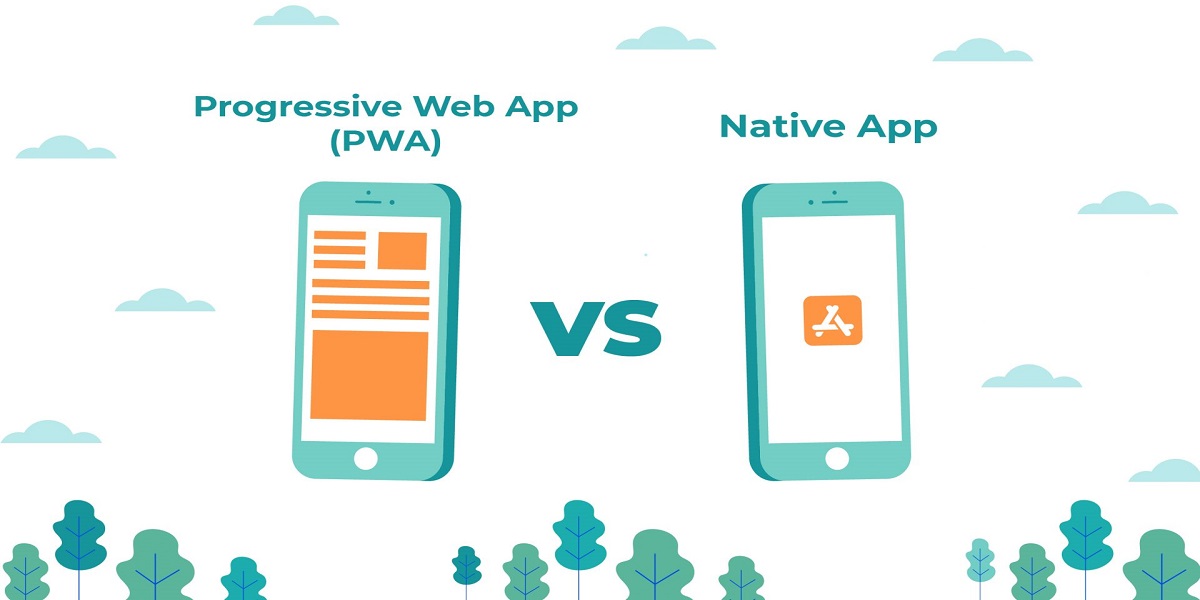
Native Apps or PWA. Which Is The Best?
- By Kapil Panchal
- 01-12-2020
- Mobile Apps
Nowadays, a mobile application has become an essential tool for every company’s kit, which delivers a great experience and good results. No matter what kind of business it is, whether it is a startup, evolving, or brand, every client consults mobile app developers for converting their business websites into a mobile app. As we have noticed in the past few years that there’s been growing support for a new type application that is Progressive Web Apps (PWA). PWA combines the functions of the native App and then accessibility of the website. Several people questioned that if PWA will replace native apps in the future. In the case of money and time-saving factor, the PWA stands tall when compared to native apps. Let us dive deep into the subject to conclude between the native apps and Progressive Web Apps (PWA).
Native apps run on Mobile Devices while PWA on Web Browser
Native applications are written to run mobile devices while Progressive Web Apps (PWA) is written to run inside a web browser. If we talk about Native apps then it has developed with the programming languages for each platform like Objective – C and Swift for iOS and Java for Android while PWA uses HTML, CSS, and JavaScript.
Development of a Progressive Web App is cost-effective
Developing a progressive web app is cheaper than building a Native app. In native app development, you suppose to learn the language and make a version for each platform which means you need at least two versions for iOS and Android and the resources to update and maintain each version. The progressive web app is faster in developing and update. In PWA development you can have one single codebase for various platforms. In PWA, you can configure your current website with the help of tools such as Google’s Lighthouse.
Native App requires Separate versions for different Platforms
Native App requires developing separate versions for different platforms where you need to submit them to various app stores. In each app store, you will have to pass a precise requirement to get published, and sometimes you have to pay a registration fee for a developer account. While PWA detours the cumbersome app store requirement where users need is a web browser and a URL.
Progressive web app remains among the top software development trends and its features are supported by popular browsers such as Safari, Chrome, Edge, and Firefox that makes it easier to reach a broad audience in a short time. In PWA, you can easily update and deploys without waiting for approvals. The web store requirement prevents low-quality apps from being published and as a result, increases reliability and gives users more confidence to access your App rather than a URL link.
Native Apps are Search-Engine Proof
Native app pages cannot be listed and indexed in the search engines. Users allow finding apps through the app store’s website or the app store. This is a process called (ASO) App Store Optimization that increases your rank in the store search results. ASO involves writing a compelling title and Meta description, keyword research, taking good screenshots relevant categorization, and reaching out to third parties for review and download.
PWA is similar to the Website experience
PWA works like any website so it can be indexed in search engines. Progressive Web Apps (PWA) has increased engagement and performance, helping your website rank better in search results. Progressive Web Apps (PWA) is an SEO friendly where you can implement an SEO structure similar to your website.
PWA is secure
PWA is more secure than regular web apps just because they run under HTTPS. PWA ensures that no security protocols exchange between the client and the server are tempered with. In the native app, you can build many security measures.
Market trend for Native mobile apps
• Mobile app offers specific and typical functionality when compared to the websites. Different devices have different categories of apps that made their popularity. For instance, iOS is popular for its game-based applications that maximize their revenue while Android popularity is enhanced due to the apps related to communication, video players, tools, local, and travel. Among these, it has been observed that the fastest-growing apps are taxi apps, ride-hailing apps, sports apps, mid-core apps, video apps.
• As the mobile industry is growing with an igniting speed, activities like downloads, advertising activities, in-app purchases have impelled businesses to generate high revenues.
As per the Statista, the total revenue for the app growth rate is estimated to reach around 935.2 billion by the year 2023.
• According to the clutch e-commerce App survey, an approx. 84% of people make their purchases through mobile apps to acquire attractive discounts.
Let us try to understand the community-driven statistics of PWA
• Zee5, a streamlining platform has launched a Progressive Web App to reach the audience in vast numbers. It has been found that the resultant PWA is 3x times faster and the buffering time has been reduced around 50%.
• Another essential platform called Kubota has launched the PWA based online store. The result has been found with 192% growth in visitor traffic and the average monthly visits imparted with a 26% rise.
• Uber’s PWA remained an outstanding platform that operates faster even on the 2G network. The user with the 2G network could load the app within 3 seconds.
• The Best Western River North Hotel has experiences a fabulous revenue growth of 300 % after adopting the PWA apps.
Conclusion
The native App requires a certain level of commitment to get the end of the download, installation process, and use of the App. In the PWA App store, installation is not required. PWA and Native app performance are excellent but native performance is better than PWA. In PWA, functions are limited compare to a native app. In Native app, push notifications to increase the chance users will engage and come back to your brand, and Geofencing helps developers to set up virtual boundaries in real life.
Progressive Web Apps are faster, cheaper, and easy to develop when compared to native apps. In the case of a native application, you need to cope with specific technologies for a specific platform. Whereas in PWA, all you need to focus on is CSS, HTML, and JavaScript.
Recent blog

The Future of Content Marketing: Human + AI Collaboration
Artificial Intelligence | 10-09-2025
How to Launch Viral TikTok Campaigns on a Small Budget
Social Media | 09-09-2025




